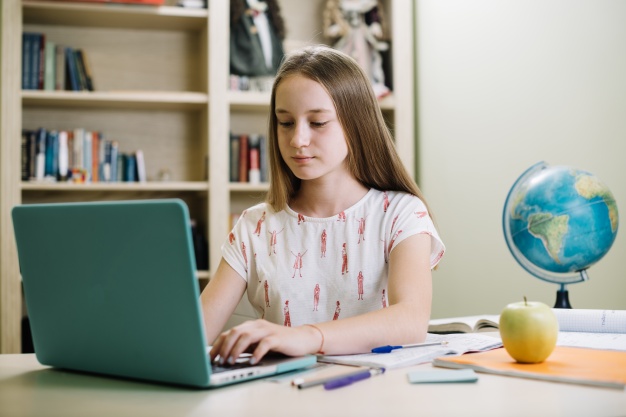Home-schooling and remote work for students

With nearly all schools closed around the world (even in countries where the lockdown is not imposed, such as Hong Kong, schools are closed) all children are experiencing home schooling nowadays. And with them parents are also learning fast the difficulty of teaching.
Funny images and videos are popping around on social media, but they are also revealing the difficulty of many parents to cope with the intensity of a school day at home during the lockdown. First of all we need to remember that many children won't have access to computer or IT tools. Getting maths exercise, spelling tests and history lessons on mobile phone is not the most practical. In some cases, parents need to go to school to get the lessons on paper.
Even for those with a chance to be properly equiped, it is not sutainable to expect children to continue their normal timetable of lessons while they are being home schooled. Many of them won't have their own computer and will have to share with their sibblings and their parents with many needing to work from home.
Many schools are providing school activities online, and around the world we find similarities: teachers are recording video lessons on Youtube, using Google drive to collect homework, dedicated tools such as padlet or the Google tool Classroom to schedule lessons and work for the week, video-conference to explain specific topics and answer questions with the class...
In addition to the existing tools put in place by each school, here are activities and online-learning you might find relevant:
- Tech We Can lesson plans were created for Years 4 to 9 (age ~8 to 13 years old).
- Short educational videos on BBC Teach.
- Following the UK curiculum, you can get access to multiple online resources for children in Primary or Secondary schools. You will just need to register on Pearson.com but resources are free of charge.
- For £40you can orde a Starter Pack for those facing school closures with The Study Buddy.
- Amazon cancelled the subscription fees for books and audio stories, making it free for children and students on audible.com during the period where schools are closed.
- ABDO's entire eBook collection is now available to students to access at home for free.
- The National Literacy Trust also launched an online zone for parents looking for ideas and activities.
- Free printable worksheets and educational activities areprovided by 123 Homeschool for ME
- Purple Mash is a website designed for children aged 3-11 which contains many creative tools: maths, spelling, grammar but also coding, animation, publishing and art.
- Beginning Monday 20 April, BBC Bitesize will publish daily online lessons for all ages. Bitesize is the BBC's free online study support resource for school-age students in the United Kingdom.
- 5-a-day provides exercise activties for movement breaks. Many of their resources are also available in French and Spanish.
- Activity Village provides thousands of colouring pages, crafts, puzzles, worksheets and more, for parents and teachers.
- All Kids Network offers free educational resources, worksheets, writing prompts, themed colouring pages, craft and snack ideas for parents, teachers and caregivers.
- Black Box Education provides a list of resources on Google drive for drama, dance and theatre.
- Prodigy Game offers curriculum-aligned math platform used by million of students.
Home schooling as an option for education in normal time
Even if education is mandatory, school is not always and you could choose for some reason to teach your child at home (it could be temporary travel, sickness, disability, extensive sport or musical activities). Home schooling already existed - as an official and regulated option - before the coronavirus crisis in some countries. All countries have different system (and you can post them in the comment box) but to show you some differences, we give you here two examples comparing the British system with the French system.
CNED in France
The National Centre for Distance Education (Centre national d'enseignement à distance or Cned in French) is the French public institution under the oversight of the Department of Education dedicated to providing distance learning material. It was created in 1939 and has been providing on-line material since the mid-1990s.
If you do not attend a school in France you may be registered with the CNED in order to validate your year and pass the exams. The price for a full year is between €300 and €800 (it includes the full pack with online access to documents and teacher available by email or by phone) but it can be free for children in France under 16 after agreement with the local education inspector. CNED is by far the most well known organisation, but private institutes (much more expensive) exist.
During the CVID19 crisis, the CNED has put online resources for homeschooling that can be accessed for free.
No regulation in Britain
Official figures published by the government’s school admissions watchdog revealed that more than 60,000 pupils were home-schooled in 2018/19. There is currently no specific requirement for parents to register with local authorities nor to follow the national curriculum if they elect to educate their child at home. However, when they are aware of home education, the council can make an "informal enquiry" to check your child is getting a suitable education at home. They can serve a school attendance order if they think your child needs to be taught at school.
Private organisations provide online courses for homschooling but can be very expensive. InterHigh, for example, ask for £2000 for the full year in Year 6 (10 year old).
French & British national
CEO Habilis Digital Ltd